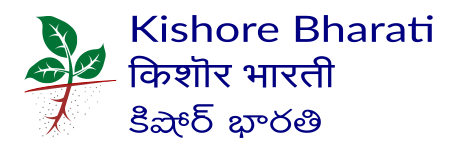On the occasion of 50 years celebration of Kishore Bharati organization, a critical reflection session (Chintan Shivir) on re-imagining education is going to be organized by Kishore Bharati, in the context of resolving the dilemmas and paradoxes of current education, and its role in a democratic republic.
Today we se that there is huge rural to urban migration of students from across India, rural native doesnt wish to live in rural regions and support rural development. Similar observations can be made about tribal communities, but most often they are forced to migrate. Though the reasons for this are not entirely due to education, the kind of aspirations that get imbibed during school and college education are also responsible. No doubt there are socio-cultural, economic, and political reasons. In this brainstorming session, we will try to focus on what kind of reforms in the curriculum and the learning environments we need to bring in reshaping education that addresses these issues head-on.
During the recent pandemic, we have witnessed massive return migrations to rural homes from the temporary urban settlements. People who were living independently, the farmers and tribals, became dependent, though we have seen partial relief from the feudal structure in the rural landscape. The mainstream school and college education system has successfully alienated and devastated the lives of our rural and tribal population. Despite being the producers of the major wealth of the country, their lives and aspirations are systematically diminished, altered and fractured. Most disappointed communities live in this country’s villages and hamlets.
KB was founded with the belief that an effective educational system can only be assessed by how well it enhances the quality of life in rural India. Several programs that KB undertook over the years reflect this engagement. This agenda is unfinished, but it is as relevant as it was in the 1970s.
The markers of authentic education (Asli Talim): No education is meaningful if it cannot provide a clear direction to alleviate poverty, make people creative and happy, address social justice, maintain a clean habitat for the coexistence of all creatures, and inculcate the values of respecting human rights. And most importantly, if education cannot make a citizen understand the relevance of the principles and rules encoded in the constitution and be able to judge the actions of themselves and others, it cannot be considered complete. As educationists, if we cannot promise this, we cannot confidently claim to seek “education for all”.
In this session of Chintan Shivir we will focus on history of Kishore Bharati, its programs such as HSTP, Nai Taleem and others and also re-look at these problems of rural education in today’s context after 50 years of establishment of Kishore Bharati, the session is inviting educationists, researchers and activists from across country to participate in a critical reflection, addressing the issues mentioned above and to arrive at a refreshing, alternative model of education.
